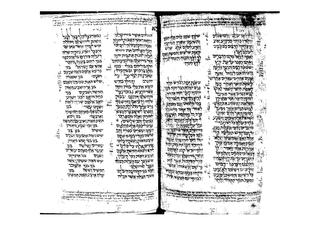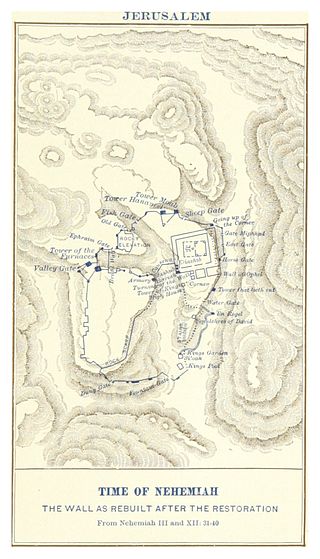Related Research Articles

Ezra is the main character of the Book of Ezra. According to the Hebrew Bible, he was an important Jewish scribe (sofer) and priest (kohen) in the early Second Temple period. In the Greek Septuagint, the name is rendered as Ésdrās, from which the Latin name Esdras comes. His name is probably a shortened Aramaic translation of the Hebrew name עזריהו, meaning "Yah helps".
The Old Testament (OT) is the first division of the Christian biblical canon, which is based primarily upon the 24 books of the Hebrew Bible, or Tanakh, a collection of ancient religious Hebrew and occasionally Aramaic writings by the Israelites. The second division of Christian Bibles is the New Testament, written in Koine Greek.

The Israelites were a Hebrew-speaking ethnoreligious group consisting of tribes that inhabited much of Canaan during the Iron Age.
The oldest surviving Hebrew Bible manuscripts, the Dead Sea Scrolls, date to c. the 2nd century BCE. Some of these scrolls are presently stored at the Shrine of the Book in Jerusalem. The oldest text of the entire Christian Bible, including the New Testament, is the Codex Sinaiticus dating from the 4th century CE, with its Old Testament a copy of a Greek translation known as the Septuagint. The oldest extant manuscripts of the vocalized Masoretic Text date to the 9th century CE. With the exception of a few biblical sections in the Nevi'im, virtually no biblical text is contemporaneous with the events it describes.

Nehemiah is the central figure of the Book of Nehemiah, which describes his work in rebuilding Jerusalem during the Second Temple period. He was governor of Persian Judea under Artaxerxes I of Persia.
The books of the Bible are the work of multiple authors and have been edited to produce the works known today. The following article outlines the conclusions of the majority of contemporary scholars, along with the traditional views, both Jewish and Christian.

Ezra–Nehemiah is a book in the Hebrew Bible found in the Ketuvim section, originally with the Hebrew title of Ezra, called Esdras B in the Septuagint. The book covers the period from the fall of Babylon in 539 BCE to the second half of the 5th century BCE, and tells of the successive missions to Jerusalem of Zerubbabel, Ezra, and Nehemiah, and their efforts to restore the worship of the God of Israel and to create a purified Jewish community. It is the only part of the Bible that narrates the Persian period of biblical history.

Joseph Blenkinsopp was an academic theologian and Old Testament scholar. He was the John A. O'Brien Professor Emeritus of Biblical Studies in the Department of Theology at the University of Notre Dame. His research focused on the Old Testament Prophets and on the Pentateuch.
David John Alfred Clines was a biblical scholar. He served as professor at the University of Sheffield.

Jacob L. Wright is a biblical scholar currently serving as professor of Hebrew Bible at Emory University. Prior to his Emory appointment, Wright taught at the University of Heidelberg (Germany), one of the foremost research-oriented public universities in Europe, for several years. His areas of expertise include Biblical Archaeology, warfare in the Ancient Near East, and the literary and redaction history of the Hebrew Bible canon. He has published extensively throughout his career, authoring several books and dozens of articles which span topics such as Ezra-Nehemiah, the Persian period, warfare in the Ancient Near East; as well as the material culture of the ancient Levant, the unique role of women in the Hebrew Bible, and larger themes such as defeat, peoplehood, and national identity in the Hebrew Bible. Areas of concentration in war studies include war commemoration, urbicide and ritual violence, and feasting and gift-giving.

Nehemiah 1 is the first chapter of the Book of Nehemiah in the Old Testament of the Christian Bible, or the 11th chapter of the book of Ezra-Nehemiah in the Hebrew Bible, which treats the book of Ezra and the book of Nehemiah as one book. Jewish tradition states that Ezra is the author of Ezra-Nehemiah as well as the Book of Chronicles, but modern scholars generally accept that a compiler from the 5th century BCE is the final author of these books. This chapter describes Nehemiah's position in the Persian court and his piety.
Peter Runham Ackroyd was a British Biblical scholar, Anglican priest, and former Congregational minister. From 1961 to 1982, he was the Samuel Davidson Professor of Old Testament Studies at the University of London. He was also President of the Society for Old Testament Study in 1972.

Ezra 1 is the first chapter of the Book of Ezra in the Old Testament of the Christian Bible, or the book of Ezra–Nehemiah in the Hebrew Bible, which treats the book of Ezra and book of Nehemiah as one book. Jewish tradition states that Ezra is the author of Ezra–Nehemiah as well as the Book of Chronicles, but modern scholars generally believe that a compiler from the 5th century BCE is the final author of these books.

Ezra 9 is the ninth chapter of the Book of Ezra in the Old Testament of the Christian Bible, or the book of Ezra-Nehemiah in the Hebrew Bible, which treats the book of Ezra and book of Nehemiah as one book. Jewish tradition states that Ezra is the author of Ezra-Nehemiah as well as the Book of Chronicles, but modern scholars generally accept that a compiler from the 5th century BCE is the final author of these books. The section comprising chapters 7 to 10 mainly describes the activities of Ezra the scribe and the priest. This chapter and the next deal with the problem of intermarriage, starting with the introduction of the crisis, then Ezra's public mourning and prayer of shame. J. Gordon McConville suggests that this chapter is central to the Book of Ezra because it draws a sharp contrast between what the people of God ought to be and what they actually are.

Nehemiah 3 is the third chapter of the Book of Nehemiah in the Old Testament of the Christian Bible, or the 13th chapter of the book of Ezra-Nehemiah in the Hebrew Bible, which treats the book of Ezra and the book of Nehemiah as one book. Jewish tradition states that Ezra is the author of Ezra-Nehemiah as well as the Book of Chronicles, but modern scholars generally accept that a compiler from the 5th century BCE is the final author of these books. This chapter records in detail the rebuilding of the walls and gates of Jerusalem, starting from the north to west sections, continued to south and east sections until reaching the Sheep Gate again, the initial starting point.

Nehemiah 4 is the fourth chapter of the Book of Nehemiah in the Old Testament of the Christian Bible, or the 14th chapter of the book of Ezra-Nehemiah in the Hebrew Bible, which treats the book of Ezra and the book of Nehemiah as one book. Jewish tradition states that Ezra is the author of Ezra-Nehemiah as well as the Book of Chronicles, but modern scholars generally accept that a compiler from the 5th century BCE is the final author of these books. This chapter recounts how the Jews had to militarize the building of the wall due to the constant threat from their enemies.

Nehemiah 9 is the ninth chapter of the Book of Nehemiah in the Old Testament of the Christian Bible, or the 19th chapter of the book of Ezra-Nehemiah in the Hebrew Bible, which treats the book of Ezra and the book of Nehemiah as one book. Jewish tradition states that Ezra is the author of Ezra-Nehemiah as well as the Book of Chronicles, but modern scholars generally accept that a compiler from the 5th century BCE is the final author of these books. This chapter and the previous one focus mainly on Ezra; with this chapter recording Ezra's prayer of repentance for the sake of the people.

Nehemiah 11 is the eleventh chapter of the Book of Nehemiah in the Old Testament of the Christian Bible, or the 21st chapter of the book of Ezra-Nehemiah in the Hebrew Bible, which treats the book of Ezra and the book of Nehemiah as one book. Jewish tradition states that Ezra is the author of Ezra-Nehemiah as well as the Book of Chronicles, but modern scholars generally accept that a compiler from the 5th century BCE is the final author of these books. The chapter describes the repopulation of Jerusalem. Judahites (4-6), Benjamites (7-9), priests (10-14), Levites (15-18), gatekeepers (19) and "the rest of Israel" (20-21). Roles in relation to leadership, maintenance and prayer in the Temple are allocated. The people cast lots and 1 of 10 are to volunteer to live in the city whilst the remainder repopulate the surrounding areas.

Nehemiah 13 is the thirteenth chapter of the Book of Nehemiah in the Old Testament of the Christian Bible, or the 23rd chapter of the book of Ezra-Nehemiah in the Hebrew Bible, which treats the book of Ezra and the book of Nehemiah as one book. Jewish tradition states that Ezra is the author of Ezra-Nehemiah as well as the Book of Chronicles, but modern scholars generally accept that a compiler from the 5th century BCE is the final author of these books. This chapter addresses a series of problems handled by Nehemiah himself, which had arisen during his temporary absence from the land, with some similar issues to those related in Ezra 9–10 and Nehemiah 10.
Mark J. Boda is a Canadian academic and Old Testament scholar, specializing in the literature and theology of the Old Testament.
References
- ↑ "Hugh WILLIAMSON". Debretts. Retrieved 24 January 2013.
- 1 2 3 "Hugh G.M. Williamson - faculty page". University of Oxford. Archived from the original on 24 September 2016. Retrieved 13 September 2016.
- 1 2 "New Year Honours 2015". University of Oxford. January 2015. Retrieved 13 September 2016.
- ↑ "Prof. Susan Gillingham - faculty page". Faculty of Theology and Religion - University of Oxford. Archived from the original on 24 September 2016. Retrieved 13 September 2016.
- ↑ "No. 61092". The London Gazette (Supplement). 31 December 2014. p. N16.
- ↑ 2015 New Year Honours List Archived 2 January 2015 at the Wayback Machine
